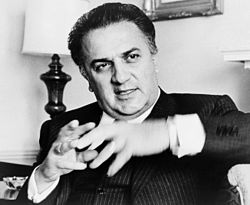Federico Fellini Quote
Borges is particularly stimulating to a man who works in the cinema, because the unusual thing about his writing is that it is like a dream, extraordinarily farsighted in calling up from the unconscious complete images in which the thing itself, and its meaning, coexist - exactly as happens in a film. And, just as happens in dreams, in Borges the incongruous, the absurd, the contradictory, the arcane and the repetitive, although as powerfully imaginative as ever, are at the same time illumined like the careful details of something larger, something unknown, and are the faultless elements of a cruelly perfect, indifferent mosaic. Even the fact that Borges's work is strangely fragmentary makes me think of a broken dreamlike flow; and the heterogeneous quality of his work - stories, essays, poems - I prefer to see not as the union of the multiple threads in a greedy, impatient talent, but as a mysterious sign of unending change.
Borges is particularly stimulating to a man who works in the cinema, because the unusual thing about his writing is that it is like a dream, extraordinarily farsighted in calling up from the unconscious complete images in which the thing itself, and its meaning, coexist - exactly as happens in a film. And, just as happens in dreams, in Borges the incongruous, the absurd, the contradictory, the arcane and the repetitive, although as powerfully imaginative as ever, are at the same time illumined like the careful details of something larger, something unknown, and are the faultless elements of a cruelly perfect, indifferent mosaic. Even the fact that Borges's work is strangely fragmentary makes me think of a broken dreamlike flow; and the heterogeneous quality of his work - stories, essays, poems - I prefer to see not as the union of the multiple threads in a greedy, impatient talent, but as a mysterious sign of unending change.
Related Quotes
About Federico Fellini
Fellini's best-known films include I Vitelloni (1953), La Strada (1954), Nights of Cabiria (1957), La Dolce Vita (1960), 8½ (1963), Juliet of the Spirits (1965), Fellini Satyricon (1969), Roma (1972), Amarcord (1973), and Fellini's Casanova (1976).
Fellini was nominated for 17 Academy Awards over the course of his career and accepted four Oscars in total for Best Foreign Language Film (the most for any director in the history of the award). He received an honorary award for Lifetime Achievement at the 65th Academy Awards in Los Angeles. Fellini also won the Palme d'Or for La Dolce Vita in 1960, two times the Moscow International Film Festival in 1963 and 1987, and the Career Golden Lion at the 42nd Venice International Film Festival in 1985. In Sight & Sound's 2002 list of the greatest directors of all time, Fellini was ranked 2nd in the directors' poll and 7th in the critics' poll.
